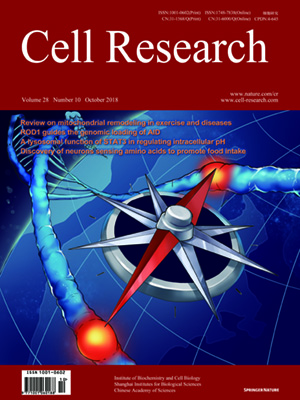
Volume 28, No 10, Oct 2018
ISSN: 1001-0602
EISSN: 1748-7838 2018
impact factor 17.848*
(Clarivate Analytics, 2019)
Volume 28 Issue 10, October 2018: 1035-1038
LETTERS TO THE EDITOR
Loss of YTHDF2-mediated m6A-dependent mRNA clearance facilitates hematopoietic stem cell regeneration
Hu Wang 1,2, Hongna Zuo 2, Jin Liu 1, Fei Wen 2, Yawei Gao 3,
Xudong Zhu 2, Bo Liu 1, Feng Xiao 1, Wengong Wang 4,Gang Huang 5
, Bin Shen 6 and Zhenyu Ju 1,2
1Key Laboratory of Regenerative Medicine of Ministry of Education,Institute of Aging and Regenerative Medicine, Jinan University,Guangzhou, Guangdong, China; 2Institute of Aging Research,Hangzhou Normal University School of Medicine, Hangzhou,Zhejiang 311121, China; 3Clinical and Translational Research Center of Shanghai First Maternity and Infant Hospital, School of Life Sciences and Technology, Tongji University, Shanghai 200092, China; 4Department of Biochemistry and Molecular Biology, Beijing Key Laboratory of Protein Posttranslational Modifications and Cell Function, School of Basic Medical Sciences, Peking University Health Science Center, 38 Xueyuan Road, Beijing 100191, China; 5Division of Pathology and Experimental Hematology and Cancer Biology,Cincinnati Children’s Hospital Medical Center, 3333 Burnet Avenue,Room S7.224, Cincinnati, OH, USA and 6Department of Histology and Embryology, State Key Laboratory of Reproductive Medicine, Nanjing Medical University, Nanjing, Jiangsu, China
Correspondence: These authors contributed equally: Hu Wang, Hongna Zuo.Correspondence: Hu Wang (wanghu19860315@163.com) orBin Shen (binshen@njmu.edu.cn) or Zhenyu Ju (zhenyuju@163.com)
Dear Editor,
Hematopoietic stem cells (HSCs) have unique self-renewal capacity to replenish the entire blood system, which is essential for various stress conditions, such as serial transplantation, ionizing radiation, anti-cancer medication, hemorrhage or infection.1 N6-methyl-adenosine (m6A), the most prevalent reversible nucleotide modification in cellular mRNA in eukaryotes,2 is associated with the maturation, translation, and eventual decay of protein-coding transcripts.3,4 “Reader” proteins of m6A modification mediate many of the properties of m6A-methylated transcripts through methyl-specific RNA binding.5,6 Although the function of m6A modification in cell fate decision of embryonic stem cells and hematopoietic stem and progenitor cells (HSPCs) has been recently reported,7,8 the role of “Reader” proteins in HSC function has not been reported yet, especially under hematological stresses. It is of great importance to understand how HSCs recognize and respond to such modifications. Here, we investigated the “Reader” protein of m6A modification in HSC homeostasis and regeneration upon various stresses.
https://doi.org/10.1038/s41422-018-0082-y
FULL TEXT | PDF
Browse 2067


